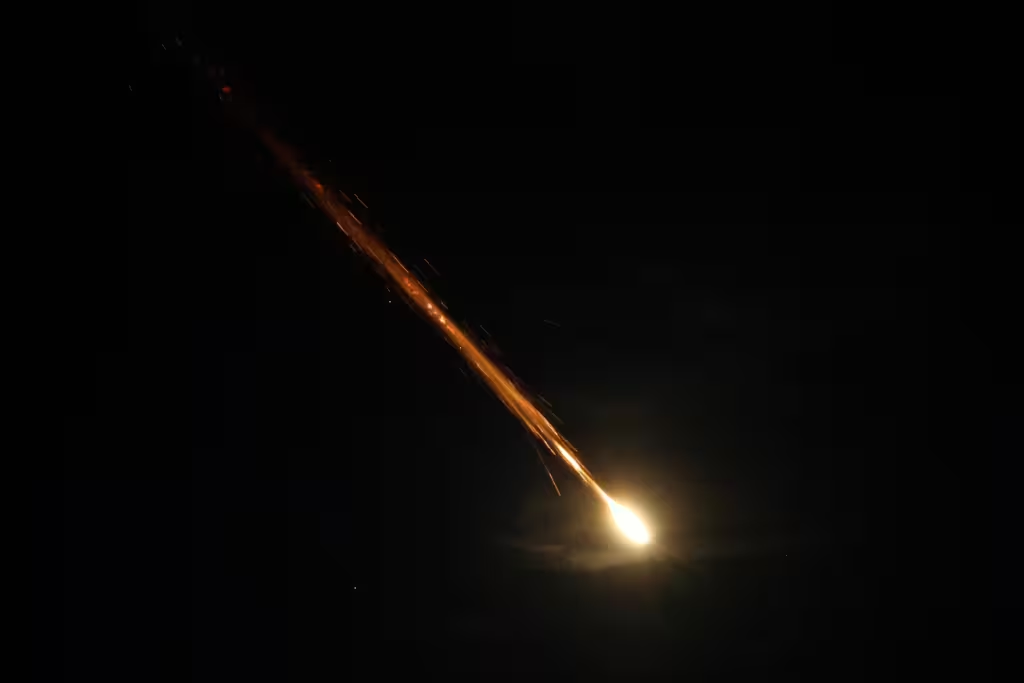Reuters

Iran fired a salvo of ballistic missiles at Israel on Tuesday in retaliation for Israel’s campaign against Tehran’s Hezbollah allies in Lebanon.
Alarms sounded across Israel and explosions could be heard in Jerusalem and the Jordan River valley after Israelis piled into bomb shelters. Reporters on state television lay flat on the ground during live broadcasts.
Israeli army radio said nearly 200 missiles had been launched into Israel from Iran. Iran’s Revolutionary Guards said Iran had launched tens of missiles at Israel, and that if Israel retaliated Tehran’s response would be “more crushing and ruinous”.
Israel’s military later sounded the all-clear and said Israelis were free to leave their shelters. Military spokesman Daniel Hagari said the military was not aware of any injuries resulting from the Iranian missile attacks.
He described the attack as serious and said it would have consequences.
A senior Iranian official told Reuters the order to launch missiles at Israel had been made by the country’s Supreme Leader Ayatollah Ali Khamenei. Khamenei remains in a secure location, the senior official added.
Reuters journalists saw missiles intercepted in the airspace of neighbouring Jordan.
Oil prices shot up five percent on the news of the Iranian missile strikes, which raise the prospect of a wider war between the two arch enemies.
A previous round of Iranian missiles fired at Israel in April – the first ever – were shot down with the help of the U.S. military and other allies. Israel responded at the time with airstrikes in Iran, but wider escalation was averted.
ESCALATION IN LEBANON
Iran has vowed to retaliate following Israeli strikes that killed the top leadership of its ally Hezbollah in Lebanon, including that group’s leader Hassan Nasrallah, a towering figure in Iran’s network of fighters across the region.
Israel said its troops had launched ground raids into Lebanon, though it described the forays as limited.
In Washington, U.S. President Joe Biden said the United States was prepared to help Israel defend itself from Iranian missile attacks.
“We discussed how the United States is prepared to help Israel defend against these attacks, and protect American personnel in the region,” Biden said on X about a meeting held with Vice President Kamala Harris and the White House national security team earlier in the day.
U.N. Secretary-General Antonio Guterres, speaking after Iran fired its salvo of missiles at Israel, condemned what he called “escalation after escalation”, saying: “This must stop. We absolutely need a ceasefire.”
Though so far characterised by Israel as limited, a ground campaign into Lebanon for the first time in 18 years pitting Israeli soldiers against Hezbollah, Iran’s best-armed proxy force in the Middle East, would be a major regional escalation.
More than a thousand Lebanese have been killed and a million have fled their homes in weeks of intense Israeli airstrikes.
In the latest announced killing of a senior Hezbollah figure, Israel said on Tuesday it had assassinated a commander named Muhammad Jaafar Qasir, describing him as in charge of weapons transfers from Iran and its affiliates.
Near the city of Sidon along the Mediterranean south of Beirut, mourners wept over coffins containing black-shrouded bodies of people killed in Israeli strikes.
“The building got struck down and I couldn’t protect my daughter or anyone else. Thank God, my son and I got out, but I lost my daughter and wife, I lost my home, I have become homeless. What do you want me to say? My whole life changed in a second,” said resident Abdulhamid Ramadan.
‘ALL OF LEBANON WILL FIGHT’
Many Lebanese said they were ready to resist Israeli forces.
“Not just Hezbollah, all of Lebanon will fight this time. All of Lebanon is determined to fight Israel for the massacres it committed in Gaza and Lebanon,” said Abu Alaa, a Sidon resident.
In Beirut, Israel struck a high-rise building in the central Jnah area and one in the capital’s southern suburbs that briefly closed the road to Beirut airport. The Israeli military said it had carried out a “precise strike”.
Israel has long said it would do whatever it takes to secure its northern border and let tens of thousands of Israelis return to towns they fled since the outbreak of war in Gaza a year ago, when Hezbollah began firing across the frontier in solidarity with Palestinians in Gaza.
An Israeli security official said troops in southern Lebanon had begun limited raids into Lebanon overnight that only went a short distance over the border, adding that no direct clashes with Hezbollah fighters were reported. The military said similar such raids had in fact been taking place in recent months.
But in a clear sign that the war could expand further, the military said it was calling up four additional reserve brigades for operational missions on the northern border.
Israel has a history of fighting in Lebanon, which it invaded in 1982 in the midst of Lebanon’s own sectarian civil war. Israeli troops finally pulled out in 2000 but returned to fight another major war against Hezbollah in 2006. Since then, the border “blue line” has been monitored by the U.N.
The United Nations said its peacekeepers had seen sporadic Israeli incursions but had not seen a full-scale invasion.
Hezbollah, a Shi’ite militia formed by Iran to resist Israeli forces in Lebanon, has evolved into Lebanon’s most powerful armed force, equipped with an arsenal of missiles and rockets. It is also Lebanon’s strongest political party, and sits at the forefront of a network of Iranian-backed armed movements across the Middle East.
